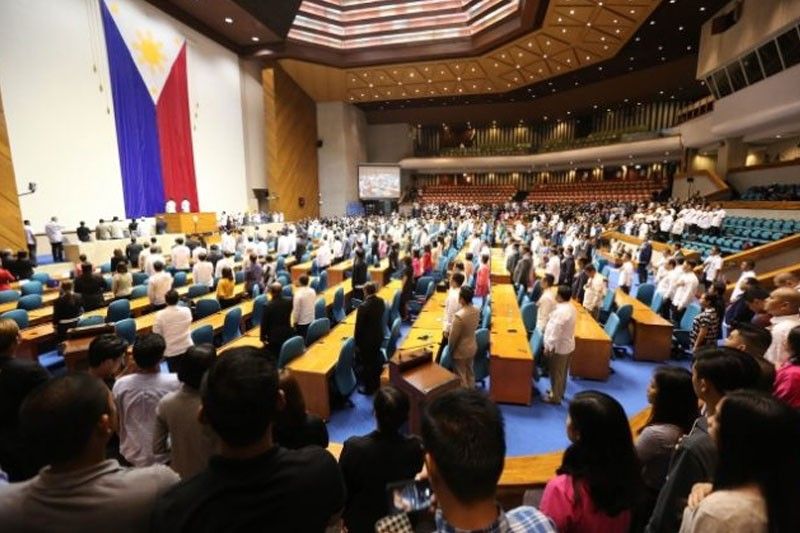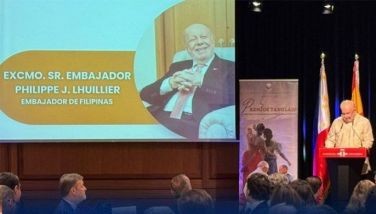Congress ratifies AMLA changes

MANILA, Philippines — Congress has ratified the measure amending the country’s anti-money laundering law.
The House of Representatives led by Speaker Lord Allan Velasco approved on Wednesday the bicameral conference committee report on House Bill 7904, which introduces more stringent provisions to Republic Act 9160 or the Anti-Money Laundering Act (AMLA) of 2001.
The Senate ratified the same bicam report earlier in the day.
Velasco said the timely passage of the measure would help the Philippines avoid inclusion in the gray list of Paris-based global dirty money watchdog Financial Action Task Force (FATF).
“We are glad that the bill is now just one step away from becoming a law and we are poised to beat the deadline for us to come up with a much stronger legislation against money laundering so we can avoid being placed on the FATF gray list,” he said.
“The Philippines cannot afford to be in that list as it would further hurt the economy already struggling from the devastating effects of the COVID-19 pandemic,” Velasco said.
Inclusion in FATF’s gray list will result in additional layer of scrutiny from regulators and financial institutions, delayed processing of transactions and blocking the country’s road to an “A” credit rating.
Velasco said he is particularly worried that the gray-listing would prejudice the business sector and overseas Filipino workers (OFWs).
“We need to avoid adverse finding against the Philippines which could lead, among others, to increased cost of financial transactions, including OFW remittances,” he said.
The FATF has given the Philippine government until Feb. 1 to enact and implement the changes to the AMLA, in accordance with its standards against money laundering and terrorist financing. The initial deadline was originally set in October 2020, but was extended due to the COVID-19 pandemic.
The Philippines was gray-listed by the FATF in 2000 for failing to address “dirty” money issues, paving the way for the enactment of RA 9160 in 2001. It was subsequently removed from the list in February 2005.
The FATF reportedly will decide in June instead of February 2021 whether or not the Philippines will be included in the watchdog’s gray list.
Velasco said the final version of the AMLA amendments would be sent immediately to the President for his signature.
The measure amends the Anti-Money Laundering Law of 2001 to further protect and preserve the integrity and confidentiality of bank accounts and to ensure that the Philippines shall not be used as a money-laundering site for the proceeds of any unlawful activity.
It also aims to facilitate the prosecution of persons involved in money laundering activities wherever committed by extending the government’s cooperation in transnational investigations on anti-money laundering cases.
The bill likewise seeks to enforce targeted financial sanctions relative to the financing of the proliferation of weapons of mass destruction, terrorism and financing of terrorism pursuant to relevant United Nations Security Council resolutions.
It expands the scope of predicate offenses by including tax crimes and violations of the Strategic Trade Management Act on the financing of the proliferation of weapons of mass destruction, as well as the definition of covered persons to include real-estate developers and brokers who engage in buying and selling of real properties.
Lastly, the measure authorizes the Anti-Money Laundering Council to implement targeted financial sanctions including the ex-parte freezing of funds and assets belonging to individuals or entities designated and listed under United Nations resolutions relating to the prevention, suppression, and disruption of the proliferation of weapons of mass destruction and its financing.
The final version of the measure included tax crime as a predicate offense to money laundering and set a threshold of P25 million.
The bicameral panel also agreed to require the submission of reports on all real estate transactions involving P7.5 million above to the Anti-Money Laundering Council (AMLC).
It also retained the House provision granting the AMLC the power to investigate, issue subpoenas and conduct search and seizure.
The final version also covered Philippine offshore gaming operators or POGOs and their service providers among the covered persons.
- Latest
- Trending



























